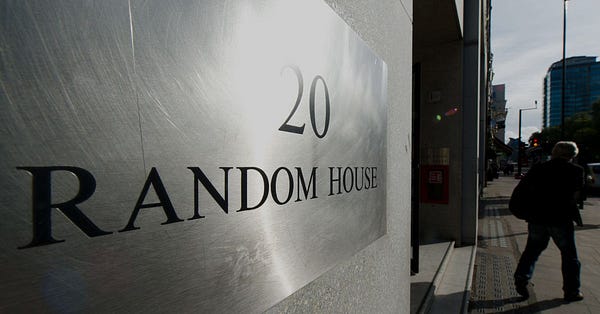
tldr; Competition policy has a role to play in promoting CanCon.
🎨 🦫. 🇨🇦
The Department of Canadian Heritage does the heavy lifting on a bunch of policy priorities that can help to ensure that various laws reflect our evolving digital world. It is currently working on legislation to reform the Broadcasting Act, asking web giants to pay for news content, and finding ways to combat serious forms of harmful content online. This is a lot to ask of one Ministry alone. It seems to me like Heritage needs support from the Competition Bureau to achieve the goal of promoting cultural and creative industries.
This is because the Ministry supports Canadian music, film, and television through a range of funding opportunities, but cannot guarantee the distribution of the resulting artefacts. The ability for Canadian content creators like authors and filmmakers to access distribution channels to widely share their work is increasingly being determined by dominant gatekeepers. “Gatekeeping” is a broad behaviour typically associated with digital platforms that act as marketplaces, such as app-stores or online marketplaces. But the practice of setting the terms of a marketplace and constraining access to smaller sellers occurs in analogue contexts as well.
There are three current examples where gatekeepers seem to be limiting access to cultural content in Canada and where competition could play a role in better protecting cultural production:
📚 1. booksellers and authors that will soon be at the mercy of a merged mega-publisher;
🎥 2. film distribution agreements that lock out smaller cinemas, blatantly privileging a dominant theatre chain over independent cinemas;
👂 3. and audiobooks that will never be made available at your local library, forcing you to build your own “Library” through a paid Audible subscription.
The gatekeeper-on-the-horizon is the pending merger of two major booksellers: Penguin Randomhouse and Simon & Schuster. Combined, the new mega-bookseller would dominate the book publishing market in Canada. In the US, the Department of Justice is seeking to block this merger. In Canada, analysts may focus their evaluation of the potential harms of the merger on the effects for authors.
If permitted, this merger could lead to a reduction in Canadian culture through restrained access to Canadian authors’ works published in Canada and/or sold to buyers in Canada. Authors would also have fewer options for publishing channels and would be likely to receive lower advances and less marketing support. The book industry notably blurs a brick-and-mortar context with digital realities, and the optional vehicle of self-publishing raises novel questions for competition analysts. Yet the real concern here may not be one of market share but rather of market power:
Will Canada’s book market be better or worse off for the transaction?
How should the country interpret a likely loss of access of independently published books to distribution channels and sales into a quantifiable measure of harm?
And, can the government help with this task, or will it fall on the shoulders of independent publishers to prove or push back on?


Further, the monopsony power of a potential mega-publisher means that it may be the only actor capable of offering larger advances to Canadian authors, thus manipulating book contracts.
The second constraint on Canadian cultural content creators is the gatekeeping by Cineplex that prevents independent cinemas from screening new films immediately upon their release. The pain and implications of this market manipulation was recently described by Kingston’s independent theatre The Screening Room in a detailed Twitter thread where the small business owner elucidated the challenges that independent exhibitors have when it comes to accessing theatrical releases.

Cineplex owns 75% of Canada’s theatrical exhibition market, and exerts their market power to demand that film distributors give them “first choice of every film” and “exclusive theatrical runs.” This means that competing cinemas must wait until these exclusive contract terms have been met before they have the opportunity to screen the same movie. This practice disadvantages smaller competitors and reduces choice for cinephiles. It is worth asking why Canada’s competition law allows dominant players to exclude smaller rivals for seemingly no reason other than reducing competition for butts in seats.

The third cultural space being shaped by a gatekeeper is audiobooks and libraries. When Audible, owned by Amazon, came to Canada in 2017, it announced that it would be investing in Canadian content, but not sharing their content with libraries. This included audiobook content that is not available anywhere else in Canada.

Further, some publishers restrict library access to ebooks until a book has been out for months as a tactic to boost sales, in addition to marking up the price for one ebook up to eight times the retail price. This restraint of trade again hurts libraries and unnecessarily constrains consumer choice.
Each of these instances exemplifies how Canada’s competition law looks the other way on the throttling of access to cultural artefacts, likely on the grounds that this conduct is “efficient”. This places the policy goals in direct conflict, just as the Government of Canada is investing in the recovery of the heritage sector, and investing in the next generation of Canadian creators and cultural leaders through the Canada Arts Training Fund.
Policymakers need to ensure that cultural content creators have fair access to the markets and distribution channels that they need to share their work and get noticed. This means fair contracts and appropriate participation in the library system.
These value-laden competition questions move us away from pure price concerns to additional considerations such as: consumer choice, the promotion of Canadian authors, the accessibility of independent films, and the autonomy of Canadian culture.
Despite a division of duties, the reality is that Heritage needs complementary, reinforcing support from the Competition Bureau to support Canadian cultural content creators. While the mandate of the Bureau is not to protect Canadian culture, cultural production is inseparable from competition. Canada’s competition law has provisions for abuses of dominance; and these three potential abuses have massive implications for the viability and vitality of Canadian content. In order to adapt the law to today’s digital reality, the Ministry of Innovation, Science and Economic Development must consider whether the Act sufficiently contemplates gatekeeping behaviour as it manifests both online and off.
These intersections between the promotion of cultural content and constrained trading channels are another reminder of the need for a comprehensive, all-of-government approach to digital policy making. Such an approach would necessitate intersecting competition concerns with Heritage priorities, among other integrated legislative considerations.
Enforcing aspirational quotas or hoping for algorithmic reach won’t actually matter if the supply of books authored by Canadians and films made by them are blocked from reaching wide audiences by greedy gatekeepers.
✨ Vass Bednar is grateful for edits and suggestions to this draft from Keldon Bester.







